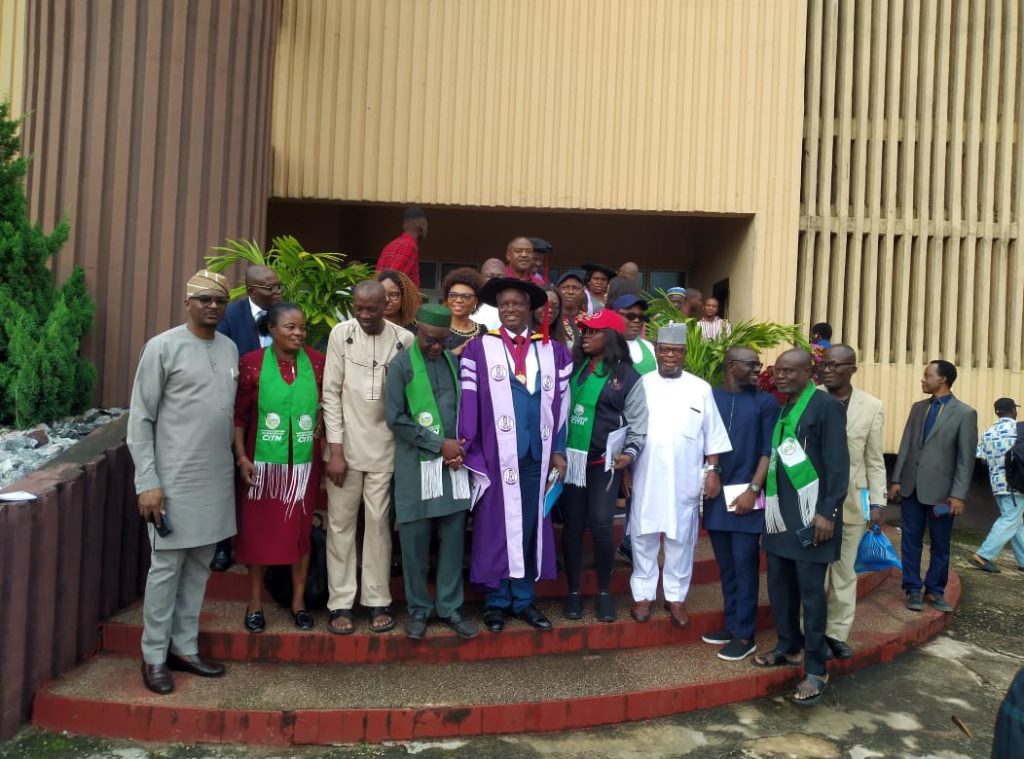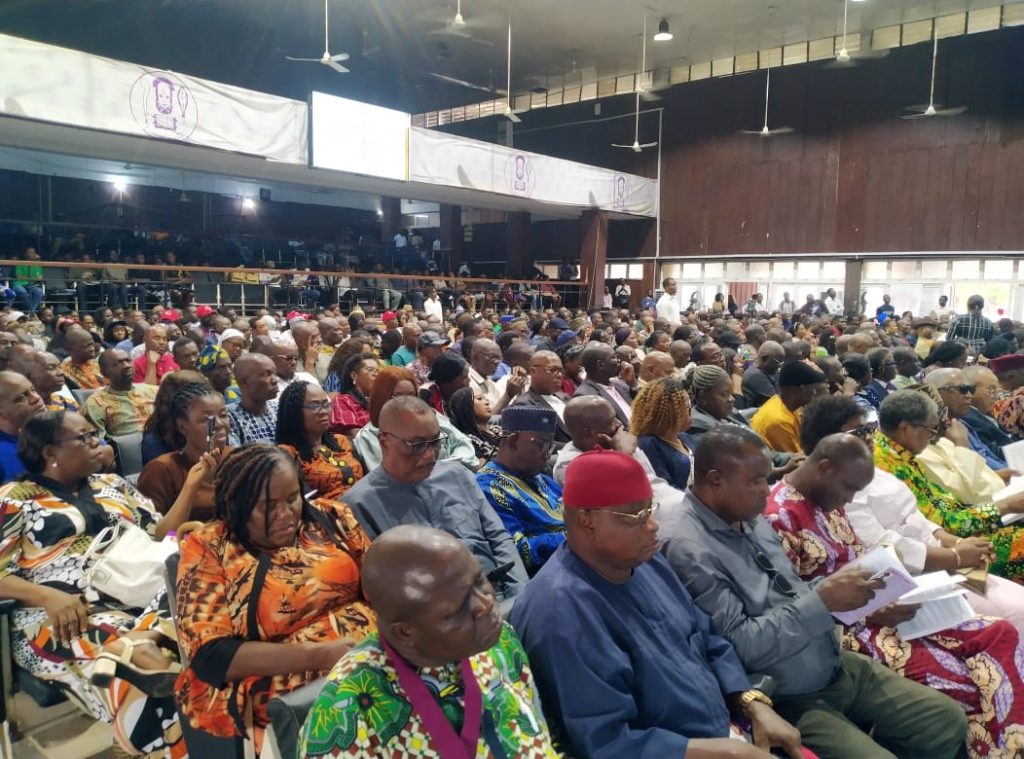By Simeon OSAJIE
A Professor of Accounting and Taxation, University of Benin and Federal Commissioner, Tax Appeal Tribunal, South-South Zone, Prof Ofiafoh Eiya has lamented that the Nigerian economy has been characterised by growth without development.
He stressed the need for all eligible taxpayers in the country to pay their taxes to the relevant tax authorities in accordance with the provision of tax laws.
Eiya made the assertion while delivering the 346th Inaugural Lecture of the University of Benin with the topic, ” Unwilling to Die, Yet Desirous of Heaven: Taxpayers’ (Non) Compliant Behaviour and the Quest for Economic Development.”
Eiya, who said the journey towards the achievement of economic development on Nigeria over the years has faced many challenges added that economic programmes such as Austerity Measures, Operation Feed the Nation, Green Revolution, Structural Adjustment Programme, Health and Housing for all by the year 2000 as well as Vision 2020 and 2030 were launched and pursued by government.

According to him, until recently when oil prices nosedive, the evidence of any aggressive tax programme undertaken by the government to shore up its revenue from taxes is lacking.
While noting that the lecture was timely especially now that the inflation rate is very high, and revenue from oil has nosedived coupled with the insecurity in the country. Eiya said the lecture focuses on a shared journey towards strengthening Nigeria’s fiscal architecture, through education, research and service.
“In Nigeria and most African countries, tax policy formulation and implementation have not been effective. Tax law and administration, which are the other components of the tax system, have not been given adequate attention.
Hence, the tax law are observed more in breaches than in compliance in Nigeria. Registration and the creation of a database for eligible taxpayers, which is the foundation of tax administration, have not been addressed effectively.
“Most of the eligible taxpayers in the formal sector are outside the tax net while others pay a fraction of their taxes and levies.
“The informal sector is worse off. According to a former Minister of Finance, the total number of tax payers in Nigeria is just 14 million cut of the 70 million economically active people and of this 149 million, about 96 percent have their taxes deducted at source from their salaries under the Pay As You Earn (PAYE) system while less than 5 percent self-employed persons comply with tax payment,” he said.

He noted that the lecture attempts to link tax compliance and economic development as a veritable concept that needs more attention from the government, saying, “We have neglected the tax system for so long.”
The Accounting and Taxation professor however recommended that the government should be more transparent and accountable to the citizens in the use of government revenues in general and taxes in particular.
At best, it will be an illusion for the government to expect individual and corporate citizens to comply with tax regulations in the absence of such transparency and accountability, he said.
He noted that it is rather unfortunate that the strongest obstacle to voluntary tax compliance by citizens in the country today is the evident lack of transparency and accountability on the part of government.
On the institutionalization of participatory and bottom-up budgetary system by the National Assembly, Eiya said, this required the engagement of citizens in the budgetary process at all electoral levels including, ward, local and State.
According to him, inclusivity is critical for monitoring the efficient and economical use of resources. On the other hand, there should be adherence to the provisions of the Public Procurement Act 2023 in the award of contracts for infrastructure, goods and services.

He also said that institutions are very relevant in driving all systems including, Nigerian Tax System, adding that the engagement of all stakeholders is critical in the implementation of the new Tax Acts.
Other recommendations are: “The Tax Appeal Tribunal should be strengthened to ensure the effective adjudication of tax disputes.
“Tax authorities should upgrade tax administration software in ‘Nigeria’ from Tax Administration 2.0 (TA 2.0) to Tax Administration 3.0 (TA 3.0), for efficiency and effectiveness.
“TA 3.0 envisions a future where taxation becomes an intrinsic part of taxpayers’ digital ecosystem. By connecting with the systems that businesses use for their operations, transactions and communication, tax administrations can significantly reduce compliance burdens and enhance accuracy.
“Taxpayers’ education should be pursued rigorously. Tax education could be a formal or a non-formal programme organised by the tax authority or independent agencies with a view to facilitating the completion of tax returns correctly by taxpayers and cultivating awareness of their responsibilities in respect of tax system.
“Tax education programmes for taxpayers have been implemented in most countries, including the USA, – Canada and the UK. Various programmes such as workshop, in-depth tax courses, and public information programme can be used for children, small biz owner, self-employed individual and corporate tax payers to provide training on the filing of tax returns, starting a business, record keeping, preparing business and personal tax returns and computation of tax liability.

“Taxation modules should be introduced as part of General studies in tertiary institutions of learning in Nigeria. This initiative is to promote tax compliance among educating tertiary institutions students, who represent a significant segment of the future taxpaying populace, on the importance of taxation, tax laws, and the consequences of non-compliance.
“Periodic enlightenment of taxpayers on the personal and social implications of tax avoidance and/or evasion should be carried out by the tax authorities under the Joint Revenue Board (JRB). In addition, campaign efforts on tax compliance should be carried out and focused especially on lower/middle aged, male, single, lower educated, self-employed and religious taxpayers. |
“The inclusion of religious bodies in Nigeria’s tax compliance campaign is recommended and a strategic imperative. In a country like Nigeria, where religious institutions command significant moral authority, the involvement of religious bodies in promoting tax compliance is not only strategic but essential.
“Religious leaders influence millions of followers across various faiths and denominations. Their teachings shape public behavior, guide ethical standards, and reinforce civic responsibility. Leveraging this spiritual influence to support tax compliance campaigns would address one of Nigeria’s most pressing developmental challenges: low revenue mobilization due to tax evasion and non-compliance”.
On recruitment, training and retraining of skilled manpower, he suggested that tax enforcement should be pursued by the tax authorities to provide necessary deterrence.
“Enforcement measures such as penalties and fines, can deter taxpayers from non-compliance and assist in the protection of government revenue by identifying and addressing non-compliance. On the other hand, the reward System should be put in place to motivate compliance, while single-point electronic verification and authentication of tax clearance certificates should be created by the Joint Revenue Board,” he declared.
